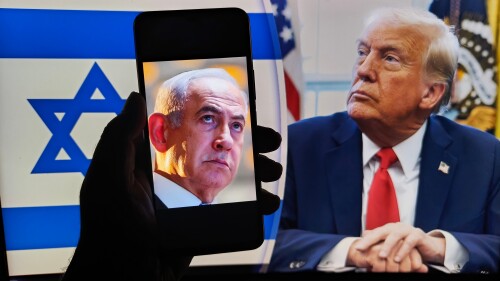Another Iranian strike on Israel looms. Iran’s proxies harass shipping in the Red Sea, attack U.S. forces in Iraq, and launch rockets toward Israel. Secretary of State Antony Blinken says Iran is within weeks of a possible nuclear weapons “breakout.” Certainly, U.S. strategy to contain Iran has failed.
Since Iran’s 1979 Islamic Revolution, U.S. strategy has undergone several iterations. Initially, Washington isolated the theocratic regime with diplomatic pressure and economic sanctions. The U.S. also threw some support behind Iraq during the Iran-Iraq War to weaken Iran and prevent its expansionism. In the 1990s, with Saddam Hussein’s regional ambitions growing, the U.S. implemented dual containment to keep both Iran and Iraq in their box. Secretary of State Madeline Albright reached out to Tehran after Iranian President Mohammad Khatami inaugurated his Dialogue of Civilizations. That went nowhere and, especially after the September 11, 2001, attacks, the George W. Bush administration intensified its efforts to counter Iran’s nuclear aspirations. The Obama-era 2015 Joint Comprehensive Plan of Action (JCPOA) marked a brief period of diplomatic rapprochement but amidst its cynicism about the JCPOA and evidence that Tehran retained its nuclear weapons ambitions, the Trump administration withdrew from the JCPOA and reimposed sanctions. The whiplash continued under President Joe Biden, who loosened sanctions and enforcement. All the while, Iran’s illicit nuclear program proceeded.
It is time to stop the vacillations. Washington should stop allowing its fear of conflict to deter effective policy. Rather, the U.S. goal should be unequivocal: overthrow of the theocratic regime and destruction of Iran’s regional proxies.
It is time to recognize the cost of endless diplomacy. Engagement allowed the regime to thwart popular uprisings, increase weapons stockpiles, and expand its regional operations. Middle-ground efforts shaped by fear only benefit Iran’s strategic goals.
Accepting the threat of open conflict need not mean war. It would augment deterrence and enable policymakers to craft a framework to achieve an aim that regional states and Iranians share: ending the Islamic Republic. To achieve this, the United States must do six things:
First, Washington must increase deterrence. To begin, the Pentagon should publicly reinforce U.S. military assets in the region beyond carrier groups and missile defense systems. For example, positioning offensive weapons systems such as the Precision Strike Missile at the Al Assad Air Base in Iraq would send a bold message to Tehran. Advertising the offensive capabilities of a Navy destroyer through public exercises with the RIM-161 Standard Missile 3 would enhance deterrence.
Second, the United States should conduct cyber warfare against the regime and its proxies. The targets should include command-and-control nodes, air defense systems, and unmanned weapons platforms in order to degrade their strike capabilities while also ensuring they are vulnerable to counterattacks. Beyond the military targets, the U.S. should actively target critical infrastructure such as power plants and water facilities to reduce the regime’s ability to provide basic services.
Third, it is essential to counter Iranian proxies with asymmetrical warfare. The Houthis are Iran’s proxy in Yemen, for example. While the U.S. Navy has played whack-a-mole against some Houthi emplacements, there has been no coordinated effort to work with the Southern Transitional Council or Northern Yemeni tribal groups that resent Houthi usurpation of power. The same strategy in Syria and Lebanon could mean leveraging groups such as the Free Syrian Army, Syrian Defense Forces, Lebanese Forces, Future Movement, and Kateab Party to politically delegitimize Iran’s standing within the location populations and, where possible, directly engage pro-Iranian forces such as Hezbollah in military operations.
Fourth, the United States must help build a regional alliance structure. Against the backdrop of the Cold War in 1955, the Eisenhower administration created the Central Treaty Organization (CENTO) consisting of Iran, Iraq, Pakistan, Turkey, and the United Kingdom. Iraq dropped out after its 1958 revolution, and CENTO never fulfilled its ambition of becoming a second NATO. Still, the Iranian menace in the region today is as grave as the Soviet threat seven decades ago and deserves a similar response. The Abraham Accords were a strong start in this endeavor.
While the Saudis have indicated they will seek to normalize relations with Israel only after the current fight and only if there is the creation of a Palestinian state, to fully accept these conditions is self-defeating. Regional states are pragmatic. Fear of Iran could form the basis of a new security paradigm. The Gulf Cooperation Council, formed in 1981 to deter Iranian aggression in the wake of the Islamic Revolution, also could provide a kernel upon which to build and coordinate anti-Iranian activities. At a minimum, the United States could create a mechanism to facilitate intelligence sharing among Arab states and Israel to counter the growing Iranian challenge.
Fifth, Washington must provide support for internal Iranian opposition with aid, training, and information campaigns. Should Iranians rise up, they should expect American support, and that support should persist even when they fail. The State Department and others can augment public support with social media campaigns to spread anti-regime narratives and empower the Iranian populace.
Finally, the United States must demonstrate seriousness by putting in force the maximum pressure. While Trump-era “Maximum Pressure” worked, the State Department’s tendency to consider carve-outs for humanitarian supplies allowed Iran to shift funds to military operations.
The whole is greater than the sum of the parts in coherent policy. To use all levers of U.S. power can enable a necessary shift to a strategic posture that will achieve real results. Nothing short of the removal of the Iranian regime, the greatest threat to Middle East stability, should suffice.








